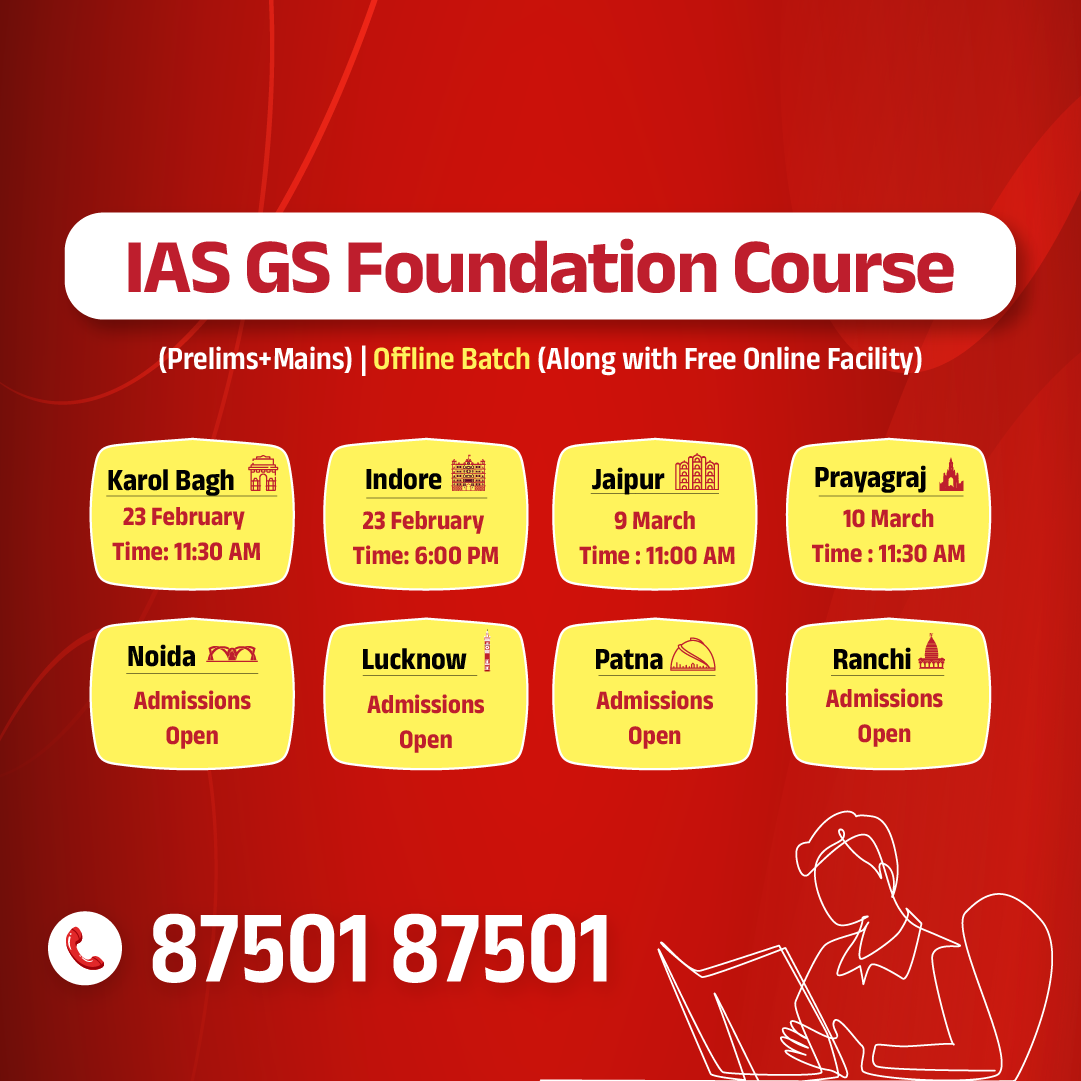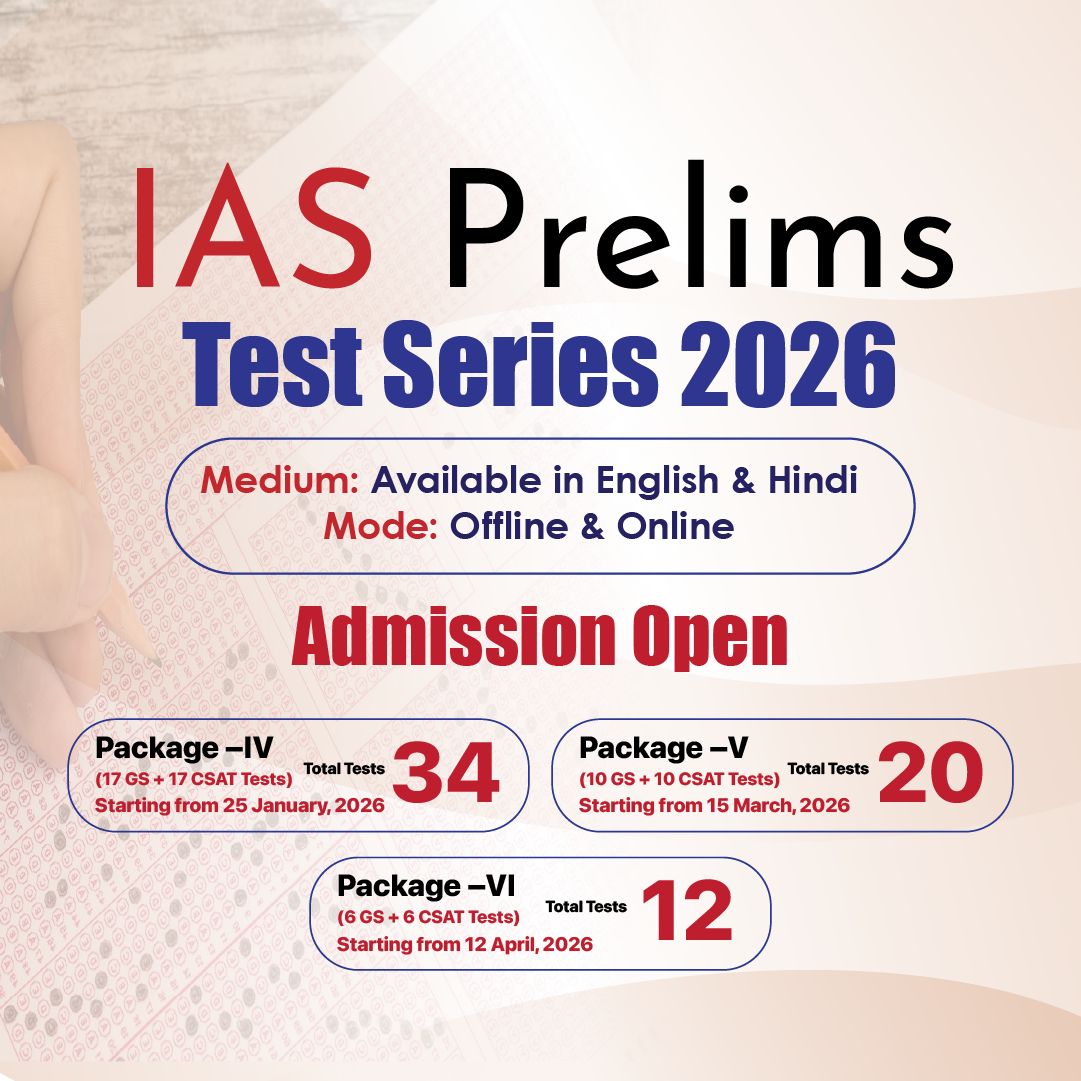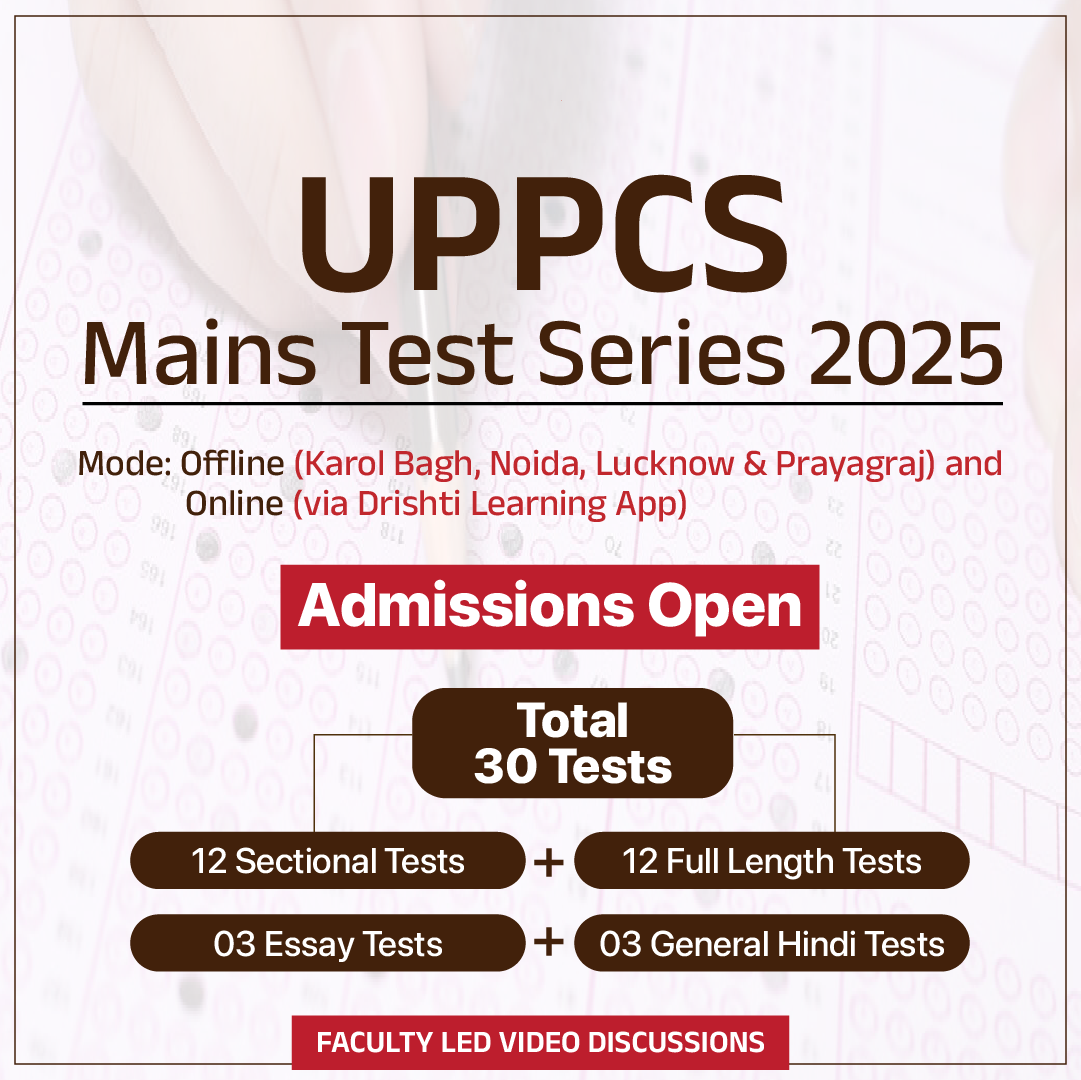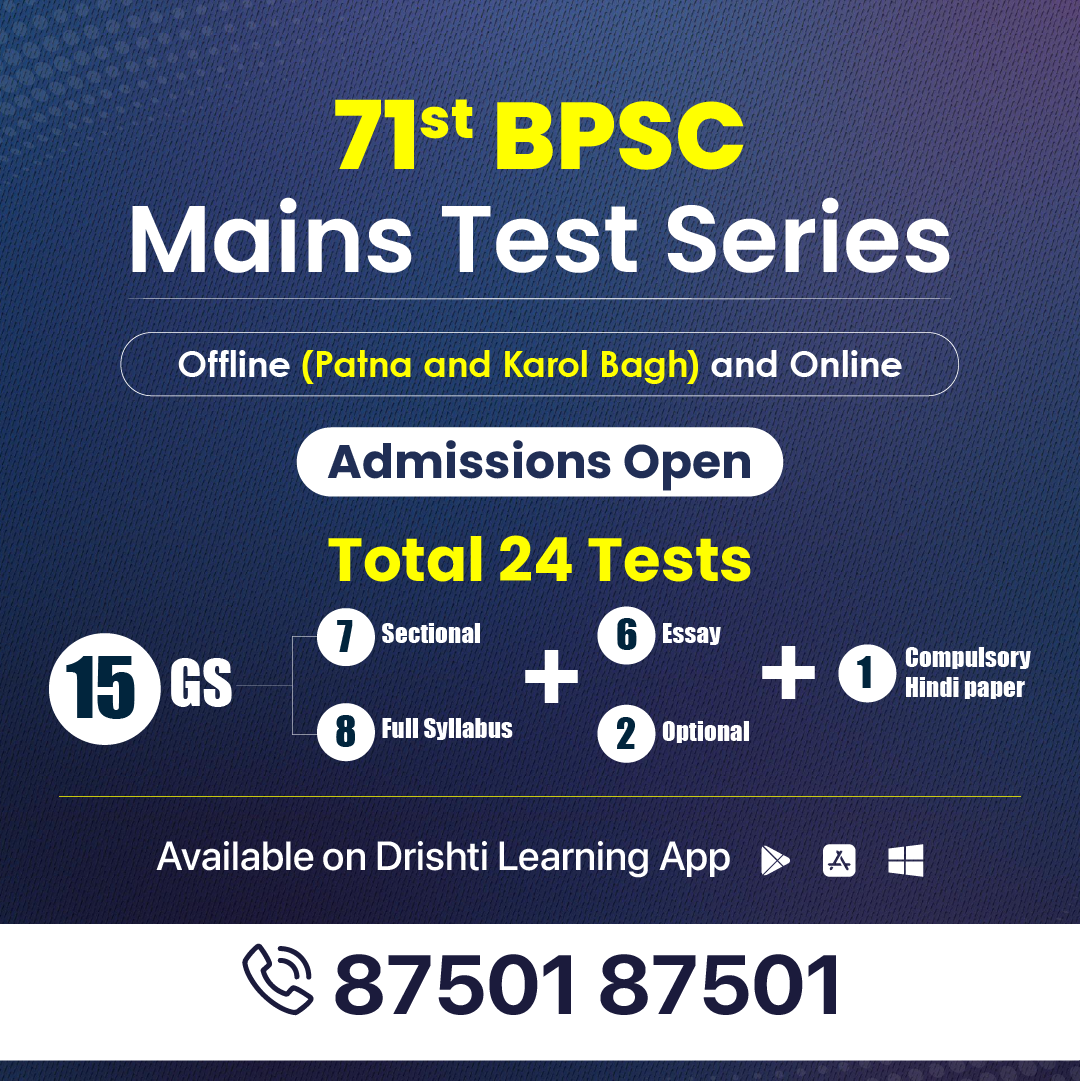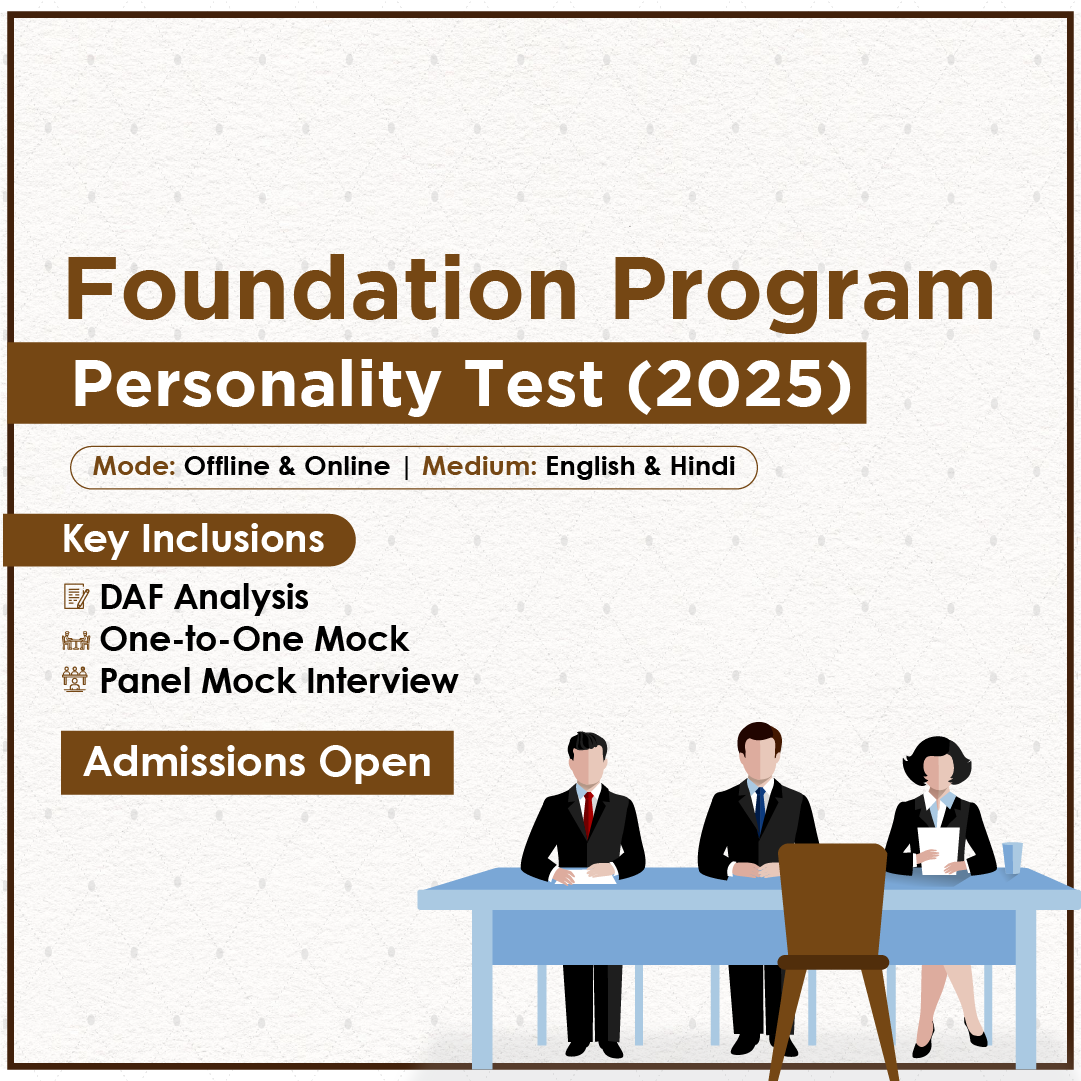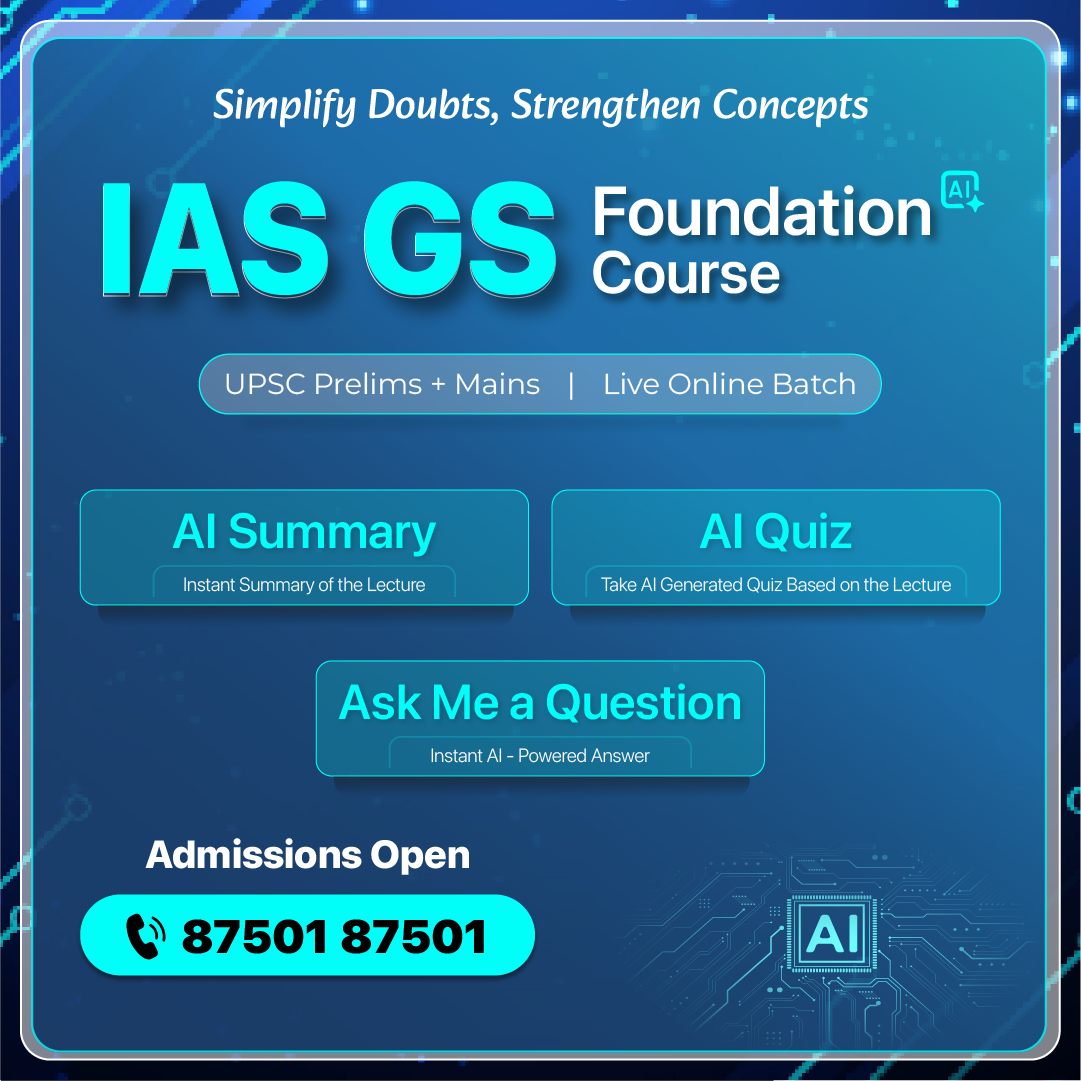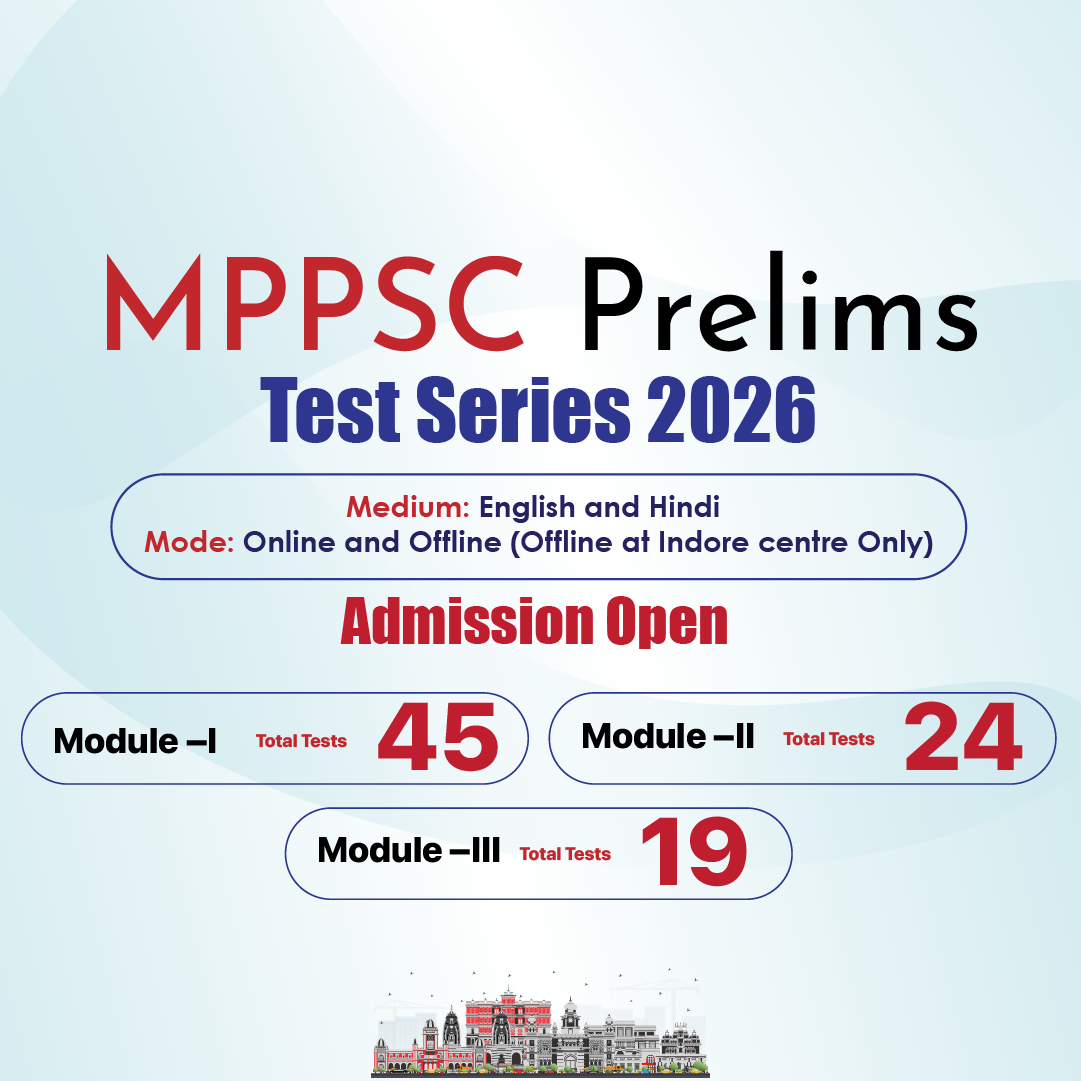Daily Free UPSC Mains Answer Writing Program
Prepare effectively for the UPSC Civil Services Mains Examination with our exclusive Daily Free Mains Answer Writing Practice Program tailored to meet the demands of UPSC aspirants. This program offers two UPSC-standard questions daily, meticulously designed to reflect the latest exam trends.
Each question is crafted to integrate current affairs with static topics, enabling aspirants to develop a well-rounded understanding of the syllabus. To help you excel, we provide detailed model answers/reference materials, equipping you with the tools to structure impactful responses and achieve high scores.
Our program also includes free answer evaluation. Aspirants can submit their answers and receive expert feedback to refine their writing skills. The evaluations focus on enhancing clarity, coherence, and precision—hallmarks of high-scoring answers in the Mains. Additionally, we offer guidance on essay writing, featuring well-researched topics, enriching reference materials, and free essay evaluations, empowering aspirants to excel in this crucial section of the exam.
Schedule for Daily Mains Answer Writing Program
| Day | Focus Area |
|---|---|
| Monday | GS Paper 1 – Indian Heritage, Culture, History, and Geography of the World and Society |
| Tuesday | GS Paper 2 – Governance, Constitution, Polity, Social Justice, and International Relations |
| Wednesday | GS Paper 3 – Economic Development, Science & Technology, Biodiversity & Environment, Security, and Disaster Management |
| Thursday | GS Paper 4 (Theoretical Questions) – Ethics, Integrity, and Aptitude |
| Friday | GS Paper 4 (Case Study) – Practical Ethical Scenario |
| Saturday | Essay Writing – Dynamic and well-researched topics |
Total Questions : 3010
-
Case Study
Ms. Leena Chatterjee is serving as a Principal Secretary (Urban Development) in a State that has committed to ambitious climate-resilient infrastructure targets. A flagship metro rail extension project—partially funded by an international development agency—has reached an advanced stage.
An internal audit flags that while the project complies with existing environmental clearances, it falls short of newly issued climate-adaptation guidelines that recommend additional flood-resilience features. Incorporating these measures would significantly raise costs and delay completion by at least a year. The funding agency has informally indicated that continued financing depends on timely delivery, not retroactive compliance.
At the same time, climate scientists and civil society groups warn that ignoring the updated standards could expose future commuters to serious risks. Political executives emphasise the urgency of inaugurating the project before the next election cycle, while senior bureaucrats caution that reopening approvals could trigger litigation and administrative paralysis.
Questions.
1. What are the ethical issues involved in this case?
31 Jan, 2026 GS Paper 4 Case Studies
2. What options are available to Ms. Chatterjee? Evaluate the merits and demerits of each.
3. Which course of action should Ms. Chatterjee adopt to balance public interest, sustainability, and administrative responsibility? Justify your answer. -
Q. While transparency and accountability are essential pillars of ethical governance, their effectiveness is limited in the absence of integrity and moral courage. Discuss with suitable illustrations. (150 words).
30 Jan, 2026 GS Paper 4 Theoretical Questions -
Q. “Ethics in public administration goes beyond personal integrity to include institutional responsibility.” Discuss . (150 words).
30 Jan, 2026 GS Paper 4 Theoretical Questions -
Q. Environmental degradation in India is closely linked with issues of livelihoods, health, and social equity.Examine the role of environmental protection measures in promoting sustainable and inclusive development. (250 words)
29 Jan, 2026 GS Paper 3 Bio-diversity & Environment -
Q. India has developed a robust and cost-effective space technology ecosystem with wide civilian applications.In this context, evaluate the contribution of India’s space technology programmes to socio-economic development. (250 words)
29 Jan, 2026 GS Paper 3 Science & Technology -
Q. “Discuss the role of the India–EU FTA in strengthening India’s strategic autonomy amid global trade fragmentation.” (250 words)
28 Jan, 2026 GS Paper 2 International Relations -
Q. “Assess the effectiveness of State interventions in ensuring social justice amid persistent structural inequalities, with reference to constitutional mandates, welfare policies, and institutional mechanisms.”(250 words)
28 Jan, 2026 GS Paper 2 Social Justice -
Q. The French Revolution was both a political and social revolution. Critically analyse. (150 words)
27 Jan, 2026 GS Paper 1 History -
Q. Examine the role of the Himalayan mountain system in determining the climate, drainage, and population distribution of the Indian subcontinent. (250 words)
27 Jan, 2026 GS Paper 1 Geography -
Essay Topics
1.“Institutions endure when values outlive individuals.”
2. “In a connected world, empathy is the new currency of leadership.”
23 Jan, 2026 Essay Essay -
Case Study
You are the District Magistrate (DM) of a rapidly urbanising district. The State Government has approved a large urban infrastructure project involving construction of affordable housing and commercial complexes under a Public–Private Partnership (PPP) model.
One of the shortlisted private firms is owned by a close relative of your spouse. The firm has a strong technical record and offers the lowest financial bid. While the rules do not explicitly bar participation of relatives, media reports have begun questioning the transparency of the selection process.
At the same time, senior political executives informally indicate that clearing the project quickly is crucial for economic growth and employment generation. Delaying or recusing yourself may slow the project and invite allegations of inefficiency.
Your subordinates are divided, some argue that merit should prevail, while others warn that public perception of bias could damage the administration’s credibility.
Questions:
1. Identify the ethical issues involved in the above case.
2.What options are available to you as the District Magistrate?
3.Which course of action would you choose and justify your decision on ethical grounds.
4.How can institutional mechanisms be strengthened to prevent such dilemmas in public administration?
23 Jan, 2026 GS Paper 4 Case Studies -
Q. Discuss the significance of impartiality and non-partisanship in ensuring ethical governance. (150 words)
22 Jan, 2026 GS Paper 4 Theoretical Questions -
Q. Discuss the ethical challenges arising from overlapping private relationships in public offices. How can conflict of interest be institutionally addressed? (150 words)
22 Jan, 2026 GS Paper 4 Theoretical Questions -
Q. Discuss the fiscal and administrative sustainability of Public Distribution System (PDS) in the context of rising food subsidy bills. How can efficiency be improved without compromising welfare objectives? (250 words)
21 Jan, 2026 GS Paper 3 Economy -
Q. How far has India’s disaster management framework moved from a relief-centric approach to a mitigation- and resilience-based approach? Discuss with suitable examples. (250 words)
21 Jan, 2026 GS Paper 3 Disaster Management -
Q. How does deglobalisation challenge the principles of liberal international economic order? Examine its impact on developing countries, particularly in terms of growth, employment, and technology access. (250 words)
20 Jan, 2026 GS Paper 2 International Relations -
Q. Examine the challenges faced by Urban Local Bodies in India in delivering basic services in the context of rapid urbanisation. How can institutional and financial reforms enhance urban governance? (250 words)
20 Jan, 2026 GS Paper 2 Polity & Governance -
Q. Discuss the impact of the declining joint family system on social security, care economy, and inter-generational relations in India. (250 words)
19 Jan, 2026 GS Paper 1 Indian Society -
Q. Indian temple architecture reflects regional diversity within a shared civilisational framework. Discuss with suitable examples from Nagara, Dravida, and Vesara styles. ( 250 words)
19 Jan, 2026 GS Paper 1 Indian Heritage & Culture -
Essay Topics
1. Nature protects those who protect it.
2. Development is not merely the expansion of choices, but the cultivation of conscience.
17 Jan, 2026 Essay Essay -
Case Study
Dr. Ananya Rao is a senior drug regulator in a state where several pharmaceutical manufacturing units produce low-cost medicines, including paediatric cough syrups, for both domestic use and export. These medicines are widely used by economically weaker sections due to their affordability.
Recently, reports emerged that a batch of cough syrups manufactured by a local company was linked to the deaths of several children after consumption. Preliminary investigations indicated the presence of toxic contaminants due to the use of substandard raw materials and poor quality control. International media coverage has raised serious concerns about India’s pharmaceutical regulatory standards, affecting the country’s reputation as the “pharmacy of the world.”
The manufacturing company claims that it complied with existing regulations and argues that stricter enforcement and frequent inspections would increase production costs, making medicines unaffordable for the poor and harming export competitiveness. Some political and industry stakeholders have informally urged Dr. Rao to avoid drastic action such as suspension of licenses, citing potential job losses, investor backlash, and diplomatic sensitivities.
At the same time, families of the affected children are demanding accountability, criminal prosecution, and compensation. Public trust in the healthcare system and drug safety mechanisms is visibly eroding.
Questions
1.Discuss the ethical dilemma between affordability of medicines, industrial growth, and the principle of ‘non malfiance’ in Bio ethics ethics.
2.What options are available to Dr. Ananya Rao in responding to this crisis? Evaluate the ethical merits and limitations of each option.
3.What course of action should Dr. Rao adopt to uphold medical ethics, accountability, and public interest while ensuring long-term credibility of the health system? Justify your answer.
16 Jan, 2026 GS Paper 4 Case Studies -
Q. Public trust in administration is a function of value-based conduct rather than procedural efficiency alone. Discuss. (150 words)
15 Jan, 2026 GS Paper 4 Theoretical Questions -
Q. Emotional Intelligence is often described as the “moral compass of leadership.” Critically analyse this assertion with suitable examples. (150 words)
15 Jan, 2026 GS Paper 4 Theoretical Questions -
Q. Explain how advances in semiconductor technology underpin developments in AI, 6G communication, and quantum computing. (150 words)
14 Jan, 2026 GS Paper 3 Science & Technology -
Q. Cyber security has emerged as a critical pillar of national security in the digital age. Discuss the major cyber security challenges faced by India and evaluate the institutional, technological, and legal measures taken to address them. (250 words).
14 Jan, 2026 GS Paper 3 Internal Security -
Q. The effectiveness of regional groupings depends not only on institutional design but also on political will among member states.Critically analyse this statement with suitable examples. (250 words)
13 Jan, 2026 GS Paper 2 International Relations -
Q. How has competitive federalism complemented or conflicted with co-operative federalism in India? Illustrate your answer with recent policy initiatives and inter-state dynamics.(250 words)
13 Jan, 2026 GS Paper 2 Polity & Governance -
Q. The Treaty of Versailles and subsequent post–World War I settlements sowed the seeds of long-term instability. Analyze how boundary reconfigurations contributed to political and social tensions in Europe.(250 words)
12 Jan, 2026 GS Paper 1 History -
Q. Population growth in India is no longer a uniform challenge but a region-specific phenomenon. Discuss the demographic diversity across states and its implications for governance and federal policy planning. (250 words)
12 Jan, 2026 GS Paper 1 Indian Society -
Essay Topics
Q1.Technology empowers, but institutions humanise governance.
10 Jan, 2026 Essay Essay
Q2.Progress without purpose is movement without meaning.


